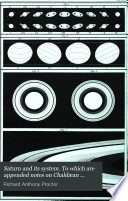 that every particle of matter in the universe attracts every other particle, with a force whose direction is that of the line joining the two, and whose magnitude is directly as the product of their masses, and inversely as the square of their distances... that every particle of matter in the universe attracts every other particle, with a force whose direction is that of the line joining the two, and whose magnitude is directly as the product of their masses, and inversely as the square of their distances...  Astronomy - Page 224by sir John Frederick W. Herschel (1st bart.) - 1833Full view Astronomy - Page 224by sir John Frederick W. Herschel (1st bart.) - 1833Full view - About this book
 | 1859 - 984 pages
...which counteracts the centrifugal force of bodies in motion. Stated abstractedly, that law is this : " Every particle of matter in the universe attracts every other particle, with a force di;ly proportioned to the mass of the attracting particle, .- inversely to the square of the distance... | |
 | Advanced reading book - Readers - 1860 - 458 pages
...mechanical forces. 1. Universal gravitation. — The principle known as universal gravitation is this, that every particle of matter in the universe attracts every other particle with a force which varies inversely as the square of the distance, ie, when the distance is doubled, the force is... | |
 | James Sanford Lamar - Bible - 1860 - 336 pages
...terrestrial gravitation, previously established, he arrived at a still more general conclusion, namely, that every particle of matter in the universe attracts every other particle with a force proportional to the product of their masses directly, and the square of their mutual distance inversely,... | |
 | Royal United Services Institute for Defence Studies - Military art and science - 1863 - 778 pages
...subject to one source of great uncertainty. Newton laid down the law of universal gravitation, " That every particle of matter in the universe attracts every other particle with a force directly proportionate to the mass of the attracting particle, and inversely to the square of the distance between... | |
 | William Hughes - Astronomical geography - 1864 - 188 pages
...exert give rise to all the celestial phenomena. Universal Gravitation is, then, the principle that " every particle of matter in the universe attracts every other particle, with a force which is inversely poportional to the square of the distance between them" or, in other words, with... | |
 | Richard Anthony Proctor - Astronomy - 1865 - 302 pages
...Newton—the last to rush from particular phenomena to general theories—in the grand cosmical law :—' Every particle of matter in the universe attracts every other particle with a force varying directly as the product of the masses and inversely as the square of the distance.' Under this... | |
 | Richard Anthony Proctor - 1865 - 312 pages
...the last to rush from particular phenomena to general theories— in the grand cosmical law : — ' Every particle of matter in the universe attracts every other particle with a force varying directly as the product of the masses and inversely as the square of the distance.' Under this... | |
 | Louis Figuier - Geology, Stratigraphic - 1866 - 542 pages
...which render it prohable that it is derivative. The law of gravitation enunciated by Newton is, that every particle of matter in the universe attracts every other particle with a force which diminishes as the square of the distance increases. Under this law a stone falls to the ground... | |
 | Albert Taylor Bledsoe, Sophia M'Ilvaine Bledsoe Herrick - Periodicals - 1870 - 560 pages
...identical with the law itself, and not something different from it. Thus, for example, the fact that every particle of matter in the universe attracts every other particle with a certain force, is the law of gravity. The observance is the law, and the law is the observance. There... | |
 | John Frederick William Herschel - Astronomy - 1869 - 590 pages
...would be urged by both powers, and therefore too much urged and forced inwards from her path. (445.) It is on such an argument that Newton is understood...particle, and inversely to the square of the distance betwcen them." In this abstract and general form, however, the proposition is not applicable to the... | |
| |